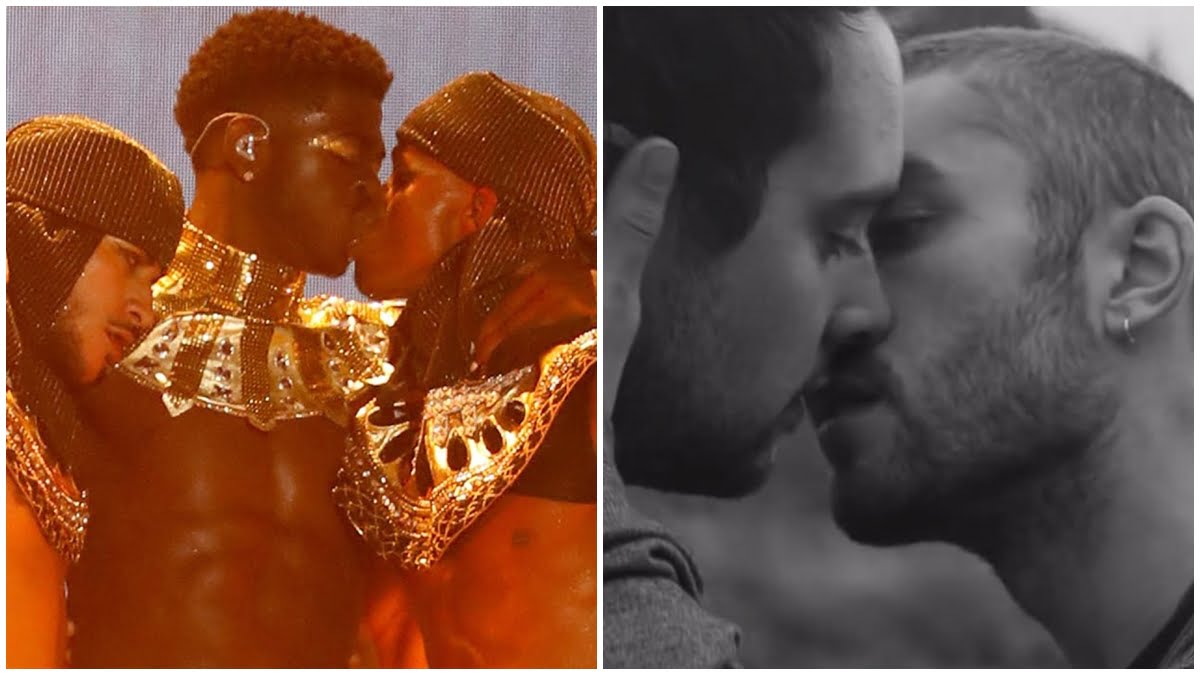From the sardonic symmetries of Hozier’s ‘Take Me To Church’, to the tongue in cheek antagonisms of Lil Nas’ ‘Montero’, a paradise of fallacies meets its demise at the hands of two cultural watersheds, one decade apart.
To the cis-het gaze, performative sexuality is an end in itself, an attempt at appeasement, a fête of sensual satiation. But the moment it becomes a means to an end, a war cry demanding that shackles of centuries be shattered, is when ‘traditionalism’ and parochiality are brandished so aggressively. As sexual autonomy burgeons beyond bounds, barriers are burdened upon it to stop the revolution. Those in doubt may behold a moment the backlash faced by Lil Nas in the wake of a fiercely queer performance at the BET awards, 2021.
From the sardonic symmetries of Hozier’s ‘Take Me To Church’, to the tongue in cheek antagonisms of Lil Nas’ ‘Montero’, a paradise of fallacies meets its demise at the hands of two cultural watersheds, one decade apart.
“Y’all hate yourselves so much. Y’all live your lives trying your best to appease straight ppl. Y’all are uncomfortable with what I do because y’all are afraid they will be uncomfortable with you. I love who I am and whatever I decide to do, (I) get there,” he had said, responding to the criticism for his performance at BET awards.
Also read: Deshadanakili Karayarilla: A 1986 Malayalam Film That Attempted To Portray Queer Teenage
The specter of a lyric from 2013 hangs starkly here: Hozier’s ‘Take Me To Church’ was another such challenge to the Catholic sacrament, that subverted the idea of ‘sin’. While the Irish musician’s haunting voice builds angst into the narrative, the lyrics connive a mordacious glorification of the Church institution’s obsession with heteronormativity. A simultaneous montage of queer love facing violent persecution takes centerstage, and the hypocrisy inherent to Western theology’s systemised attack on the very human sentiment of love is exposed.
“The only Heaven I’ll be sent to//Is when I’m alone with you//I was born sick, but I love it//Command me to be well…”
- Take Me To Church
The audio-visual appeal of ‘Montero’, on the other hand, lies in its audacity. If ‘Take Me To Church’ is an elegiac tragedy, then Lil Nas’ art is the crescendo of rebellion that follows. It heralds a watershed movement in queer counterculture, calling on the persecuted to declaim the alienation that has fallen into their lot.

Lounging in the Garden of Eden (an apt metaphor for a ‘prudent’ society riddled with conservatism), the singer gets seduced by a doppelganger serpent. Might as well, because he can no longer flee his own truth afterwards. Maybe the original sin all along, in the eyes of the Church, was the ‘temptation to love’. Lil Nas’ radical repudiation of religiously-sanctioned homophobia has rightly earned him the epithet of the proverbial Anti-Christ from some sections of the press.
The Black and White visuals of ‘Take Me To Church’ paint a grim picture of homophobia. The decade old cinematography and eerie beat attest to a time when Pride was still a snapshot into a long history of oppression. ‘Montero’, however, looks ahead to a rainbow future with its psychedelic colours and visuals. It is loud, cantankerous, and intended to shock those viewers who are at complacence with the debilitating hierarchy of the politics of sexuality. It thaws down thought slavery to mindless traditions, and deliberately discomfits the biblical archetypes of ‘propriety’ fed into the society’s mass conscious.
“In life, we hide the parts of ourselves we don’t want the world to see. We lock them away, we tell them, “No.” We banish them. But here, we don’t. Welcome to Montero.”
- Lil Nas
If Hozier poetised queer persecution in his homeland, then Lil Nas is vehemently reclaiming a space for queer black bodies. Poles apart in their experiences, the two lyrics find a common ground in their challenge to the very biblical idea of ‘perfection’. Their musical rebellion clashes against the sensibilities of Western theology personified as a perfectly symmetrical heaven that demands submission before societal sensibilities of the ‘right’ and the ‘wrong’. There is a paradox inherent to the sardonic spectacles woven so delicately in Hozier and Lil Nas’ crooning voices: themes of Western art are incorporated in a manner that they end up self-destructing.

History be my witness: outmoded archetypes must degenerate, giving way to greater autonomy for the individual. There come eras in history so annihilative in their ethos that all corrals of “conventionality” get swept away in the throes of progression. We must pause a moment and ponder upon the fallacies inherent to the Western cis-het gaze that has long exercised an insidious hegemony over the Eastern subconscious and subverted all culturalism inclined to sexual autonomy.
Also read: Hozier: The Artist Who Brought The Church Home
Paradisiacal peripeteias notwithstanding, the two lyrics should also make us question if Indians have mistakenly adopted another culture’s roots as their own. Case in point: the tales of Bhagiratha, a devotee of lord Shiva, often hesitate to mention that he was born of two mothers. This story is a strong testament to the acceptance of queer love in Indian culture. What is the reason for its commonplace retraction then? Why is there persistent shame over narratives that were passed down by word of mouth for centuries? The answer is that we have been looking for shards of ourselves in a ruthlessly suppressive colonial past.
Our roots and root problems are foreign enough to be outcast//Cast out of ourselves, strangers to ourselves//We rule the day in others’ judgement.
Colonialism bequeath us some painful disjunctions from our long history of celebrating love in all its shades. The rigid Victorian morals imposed upon the country soon created a taboo out of queer love. Colonial era laws unabashedly demonised it. A societal homecoming would perhaps be rediscovering our long-lost values and reclaiming our roots as Lil Nas is reclaiming his sexuality from cis-het fetishisation and perceptions of ‘morality’.
The rigid Victorian morals imposed upon the country soon created a taboo out of queer love. Colonial era laws unabashedly demonised it. A societal homecoming would perhaps be rediscovering our long-lost values and reclaiming our roots as Lil Nas is reclaiming his sexuality from cis-het fetishisation and perceptions of ‘morality’.
The two lyrics are two cultural watersheds, two artistic victories over the theological conservatism that binds our post-colonial world in shackles. ‘Picket-fence’ propriety or the ‘log kya kahenge?’ culture perishes before the queer strength and solidarity that they embody. Here’s to hoping for more such era-defining moments in the world of art!
Samya Verma is a third-year student of history at Hindu College, University of Delhi. She loves reading, writing, journaling, and etymology. You can reach out to her at samyasverma.work@gmail.com, Linkedin and Instagram.




